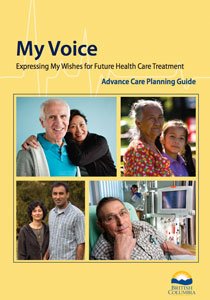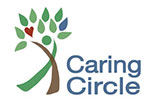Advance Care Directives
Nidus Personal Planning Resource Centre
The Nidus Personal Planning Resource Centre is a non-profit, charitable organization. Nidus provides information to British Columbians about personal planning, specializing in Representation Agreements. We also operate a centralized Registry for personal planning documents.
Personal planning is about making legal arrangements in the event you need assistance managing your affairs during your lifetime due to illness, injury or disability. Personal planning can address all areas of your life – health care, personal care, legal affairs, and financial affairs.
 My Voice – Expressing my Wishes for Future Health Care Treatment
My Voice – Expressing my Wishes for Future Health Care Treatment
A very interesting and informative seminar was held at Bowen Court on Friday, June 14th, 2013, with over 20 people in attendance. We listened to Barbara Greenlaw, a representative of Vancouver Coastal Health, speak on this very important topic of planning an Advance Directive document.
The Advance Care Directive is part of a new incapacity or personal planning legislation that came into force in B.C in 2011. This Advance Care Directive helps to alleviate some of the stress that family and friends could face if they are asked to make important health care decisions for a loved one.
Anyone capable of understanding and communicating with the doctor or other health care provider will be asked to make his or her own health care decisions. It is only when a serious accident or illness renders a patient incapable of doing that, the advance care plan will inform caregivers of his or her wishes.
This type of document was formerly called a “Living Will”, but that was not a legal document and therefore didn’t have standing in law. This Advance Care Directive is a legal document, hence the careful planning required to complete it.
The belief is that it will take about 5 years to have Advance Care Directives a part of the the same documentation people deal with upon natural milestones – marriage or permanent relationship, purchase of a first home, birth of a baby. Currently a Will and Enduring Power of Attorney are recommended – soon preparation of an Advance Care Directive will also be advised by Financial Planners, doctors and so on.
The Ministry of Health will be informing and educating people via volunteer outreach, community meetings and so on to get the word out. The aim is to provide workshops and “fireside chats” in all places for all ages – libraries, recreation centres, resource centres such as Caring Circle and so on.
Barbara’s strong message is talk to your family – have ongoing discussions, not just one, on this topic. Engage and encourage them to do their own Advance Directives and ensure they understand why you’re doing yours. This is not something that only old people do! Introduce adult children to their website and send them links, Youtube videos and have discussions around this important subject. Keep broaching the topic. The object is not to make specific decisions around feeding tubes, suction, iv’s, life support and any other intervention but to focus on your values and beliefs and the quality of life you’d like to live. In other words, think about what level of incapacitation are you willing to accept.
50% of us will not be able to speak for ourselves in the last stages of life.
We deal with many health care issues and discuss them moreopenly now than we did some years ago – death and dying is the last topic we still have trouble dealing with. Statistics show that 80% of people over 60 will have to deal with chronic illness.
Advance care planning eliminates moral distress and is a gift you give to your family.
Check back here or contact the Resource Centre for information on another workshop. It is hoped that we can get a core group of trainers to learn more about preparing an Advance Care Directive in order to assist others in preparing theirs.
For the online version of this book click here.
For the “Quick Tips” sheet handed out at the workshop, click here.
Participants in the workshop expressed an interest in documentation relating to when someone has died – here are some useful links:
Faces of Palliative Care

Dr. Patricia Boston, clinical professor in the Faculty of Medicine at the University of British Columbia, at a beach on Bowen Island.
Bowen Island Undercurrent
Published: June 24, 2013 12:00 PM
Despite the advances in drug treatment and exemplary practices in western society, palliative and hospice care remains a mystery to most, often viewed with fear and apprehension by both the general public and health care professionals as a place of abandonment and hopelessness.
Faces of Palliative Care challenges these preconceptions of the end of life experience and illustrates a changing world of palliative care through a series of personal stories about the collaboration between families, caregivers, and those suffering with a life limiting illness. It answers questions about how palliative differs from other areas of medicine, how it is delivered and how patients can access end of life care.
Bowen Island resident, Dr. Patricia Boston, clinical professor in the Faculty of Medicine at the University of British Columbia, and Douglas Nicolle, head of Telehealth and Media Services for St. Paul’s Hospital, Providence Health Care, co-produced the documentary for the UBC Faculty of Medicine. Faces of Palliative Care provides a definitive look at current palliative care practices in British Columbia.
“Palliative care programs can give a purposeful end of life to those faced with life-limiting illness. Faces of Palliative Care examines the current and exemplary palliative care practice available to assist patients and their families in achieving comfortable and meaningful end of life experiences when circumstances set end of life decisions in motion,” explains Dr. Patricia Boston.
Two years in production, the video was shot in various facilities in and around Metro Vancouver, like the Vancouver General Hospital, Marion Hospice, Canuck Place Children’s Hospice, Richmond Hospital Palliative Care Unit and The Rotary Salvation Army Hospice in Richmond.
Faces of Palliative Care will be aired on BC CBC on June 29 at 7 p.m. as part of the Absolutely Vancouver summer series of documentaries.
See the 3 minute promo video here: http://www.youtube.com/watch?v=xbyW5dvQe1Y&feature=youtu.be
